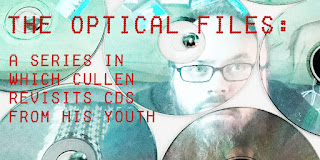Still recovering from a serious motorcycle accident, taking what would prove to be an 8-year break from touring, & working out lots of songs with the group that became known as The Band, when Dylan returned to the studio in 1967 it was with a very different outlook. The album that resulted from these sessions was an earthy antidote to the art-rock excesses of Blonde on Blonde, both musically & lyrically. The music on John Wesley Harding is sparse to the point of minimalism, & the strange verbal strategy plus the consistent sound add up to an album that's hypnotically soothing & almost tantric in its contemplation.
9 of the album's 12 songs are played by a trio: Dylan on guitar & harmonica, Charlie McCoy on bass & Kenny Buttrey on drums. I've always loved Buttrey's drums on this album: dryly produced, insistent, but full of subtle touches like his shift into a funk/soul pattern in the back half of the title track. McCoy is also a star here: with such a minimalist arrangement, the bass has plenty of room to shine, & his active playing livens up songs like the Irish folk-inspired "As I Went Out One Morning," which is almost a showcase for him. An album this rustic has no business being this funky too, but the rhythm section makes it so.
The guitar/bass/drums/harmonica setup is so consistent that when another instrument does pop up--like the piano in "Dear Landlord" & "Down Along the Cove," or the steel guitar in the latter song & "I'll Be Your Baby Tonight"--it's striking, as if the whole album has taken a big turn just by adding 1 instrument. "Dear Landlord" is probably the most interesting composition here, with more playful bass runs by McCoy & Buttrey laying down a heavily swinging blues shuffle. Bob plays swanky chords on the piano & sings it with more soul than we'd really heard from him up to this point. "I'll Be Your Baby Tonight" also plays with genre, unfolding as a pure country 2-step ballad with the twangy pedal steel to prove it. It simultaneously points toward the next album Nashville Skyline whilst being more country than anything thereupon.
Dylan's lyrical strategy has undergone an evolution too since the 3-album run that preceded this. No longer is he using extravagant language to obscure meaning--he's now using simple language to tell riddles. There is a mystical quality to the songs here in their simplicity & their oblique religious references. The lyrics feel more like zen koans than songs--for the first time, it seems Dylan doesn't want you to decode his lyrics, he just wants you to let the sounds & associations seep into your brain.
If you noticed I've used a lot of words in this writeup like tantric, mystical, religious, & zen, that's because in some opaque way, John Wesley Harding is a deeply spiritual album. It's not explicit in any given song, but the congregate impression is of more searching & grasping for faith than any of his explicitly Christian albums from subsequent decades.
"My trip hasn't been a pleasant one, & my time it isn't long/& I still do not know what it was that I've done wrong."


No comments:
Post a Comment